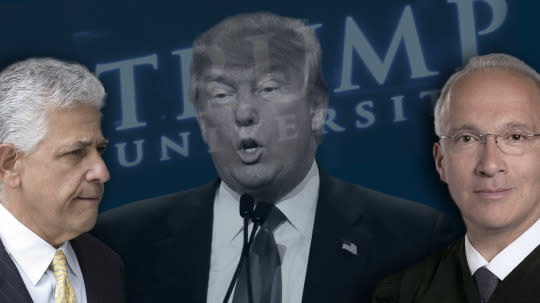Actions speak louder than Trump: His own lawyer said “the judge is doing his job” in Trump U. case
Just three weeks before Donald Trump triggered a national firestorm over his claims that U.S. Judge Gonzalo Curiel was biased against him because of his Mexican heritage, his lead lawyer in the Trump University case praised Curiel for a “sound decision” and said he had no plans to file a motion for him to be recused.
“The judge is doing his job,” said Daniel Petrocelli, shaking his head, when asked if planned to seek Curiel’s recusal. “We’re not seeking to recuse the judge.”
The comments by Petrocelli, who heads the defense team for the presumptive Republican nominee, were made to reporters outside the federal courthouse in San Diego on May 6 (and videotaped by Yahoo News) after a key pre-trial hearing on the Trump University case. They got no national media attention at the time.
But they could now undercut Trump’s repeated assertions that Curiel, who was born in Indiana, had an “absolute conflict” because he is “Mexican” and should therefore disqualify himself. Legal experts across the political spectrum and Republican Party leaders including House Speaker Paul Ryan and Senate Majority Leader Mitch McConnell have denounced Trump’s slurs on Curiel’s impartiality.
“I’ve been treated very unfairly by the judge,” Trump told CNN’s Jake Tapper last Friday. “This judge is of Mexican heritage. I’m building a wall. … I think he should recuse himself.”
Petrocelli, a renowned civil litigator who has spearheaded Trump’s defense in the Trump University case, praised Curiel after the May 6 hearing and for good reason: The judge had arguably done Trump a huge favor. The plaintiffs in the case, who claim they were defrauded out of tens of thousands of dollars they paid for Trump University seminars they say were largely worthless, had pushed for a trial date this summer in the 6-year-old case — right after the Republican Party convention. “Justice delayed is justice denied,” Jason Forge, one of the plaintiff’s lawyers, had argued to Curiel that day. “There are people who are still paying off their debts for the money they paid to Trump University.”
But Curiel rejected that argument and pushed the trial back to Nov. 28 so as not to interfere with Trump’s campaign for president. It was no small break for the presumptive GOP candidate, since he is the lead defendant in the case and would likely be the chief witness in a trial that is expected to last at least a month.
Although Petrocelli had sought a trial date in February — by which time Trump, if he wins the election, would actually be president — he praised Curiel’s ruling that day. “We’re pleased that this case is not going to trial [while] Mr. Trump is preparing for the presidential election,” he told reporters outside the courtroom. “We think that’s a sound decision by the court.”
Later, when rejecting the idea of a recusal motion against Curiel, Petrocelli added: “I think the court today did a good job of trying to balance out competing interests.”
Petrocelli declined to comment to Yahoo News Monday on his opinion of Curiel. And despite his comments last month, he and Trump have other rulings by Curiel to object to, notably his denial last November of a motion by Trump to dismiss the case on summary judgment (Curiel had concluded there were “genuine issues of material fact” to resolve about Trump University) and his decision last March to allow Tarla Makaeff, the lead plaintiff in the class-action case, to drop out and be replaced by another plaintiff. (Makaeff had said she was unable to continue because of pressing health problems. At the request of Trump’s lawyers, Curiel then reviewed her health records and concurred.)
But legal experts say that Petrocelli would have little to no chance of prevailing in a legal motion to recuse Curiel because of perceived bias due to his ethnic background — a major reason he has pointedly failed to file such a motion. “It would have zero legal merit,” said Stephen Gillers, a New York University law professor who specializes in legal ethics. “A judge’s ethnicity, gender and race is never a grounds for recusal. It’s quite clear. A lawyer would not make that motion without fear of being sanctioned.”

In fact, Gillers said, there is even legal precedent for sanctioning lawyers who make such motions: In 1998, lawyers in a civil case moved to disqualify federal Judge Denny Chin, who is Asian-American, because some of the parties in the case were also Asian-Americans. Not only was the motion rejected, one of the lawyers was later sanctioned by Judge Chin — a decision that was later upheld by a U.S. appeals court.
There is an even more recent precedent against such recusals in the same judicial circuit where the Trump University case is being tried. One of the parties seeking to overturn a ruling by then U.S. Judge Vaughn Walker in favor of same-sex marriage on the grounds that Walker was gay. In a unanimous ruling in 2012, a U.S Court of Appeals panel rejected the idea that Judge Walker’s sexual preference compromised his impartiality. “To hold otherwise would demonstrate a lack of respect for the integrity of our federal courts,” the judges concluded.


